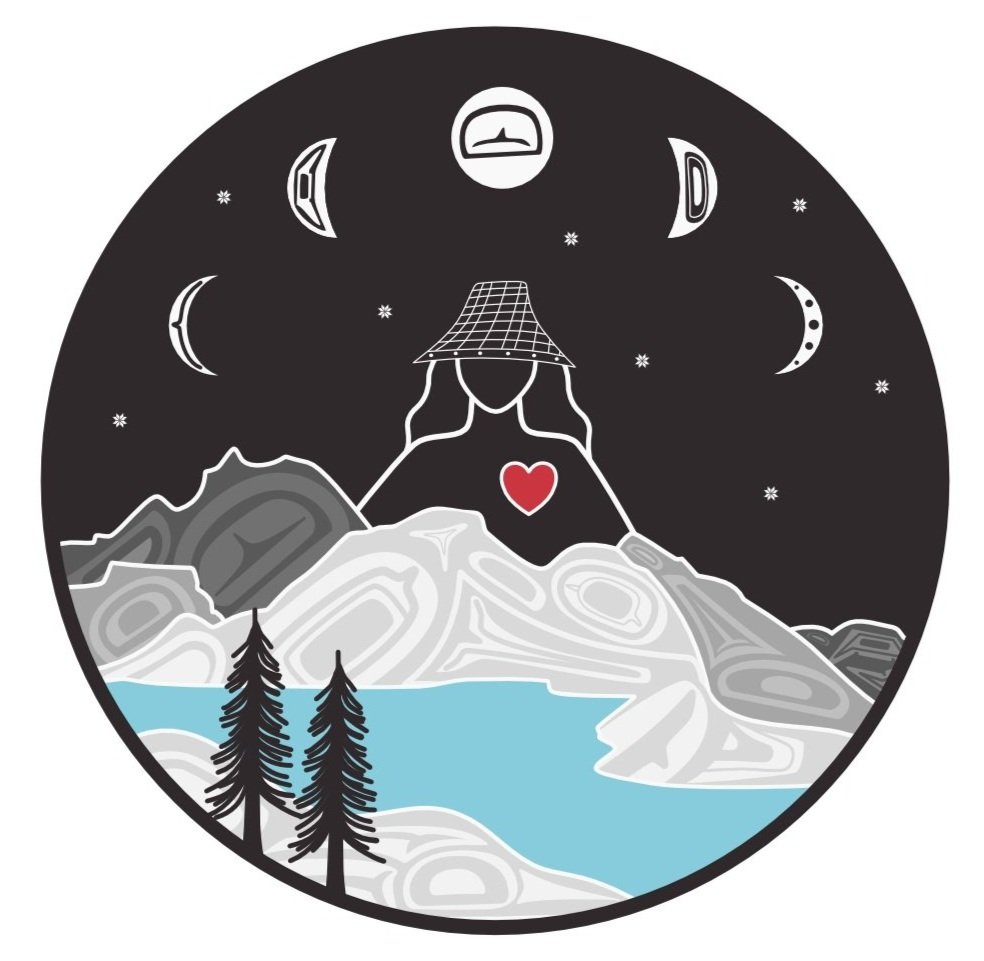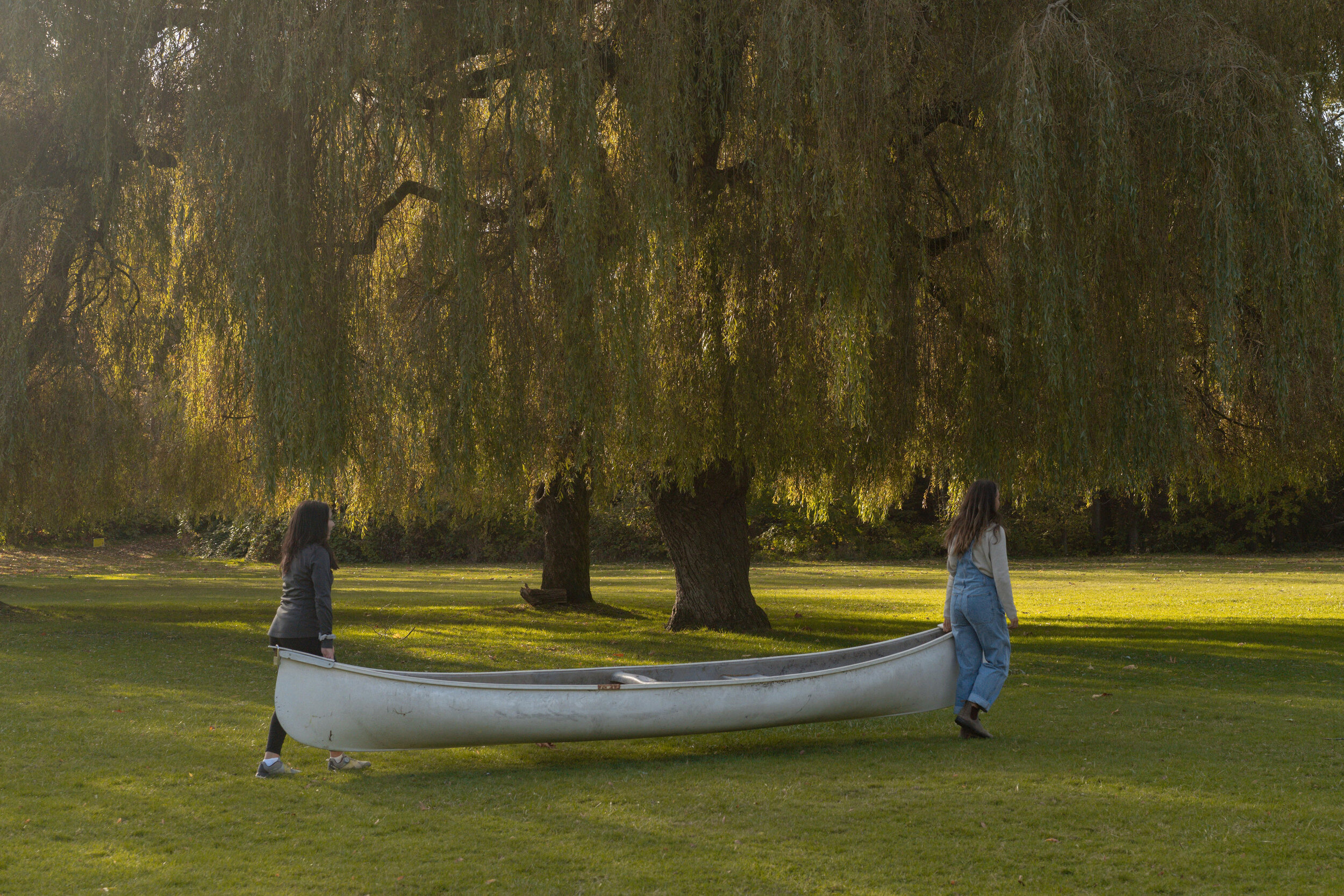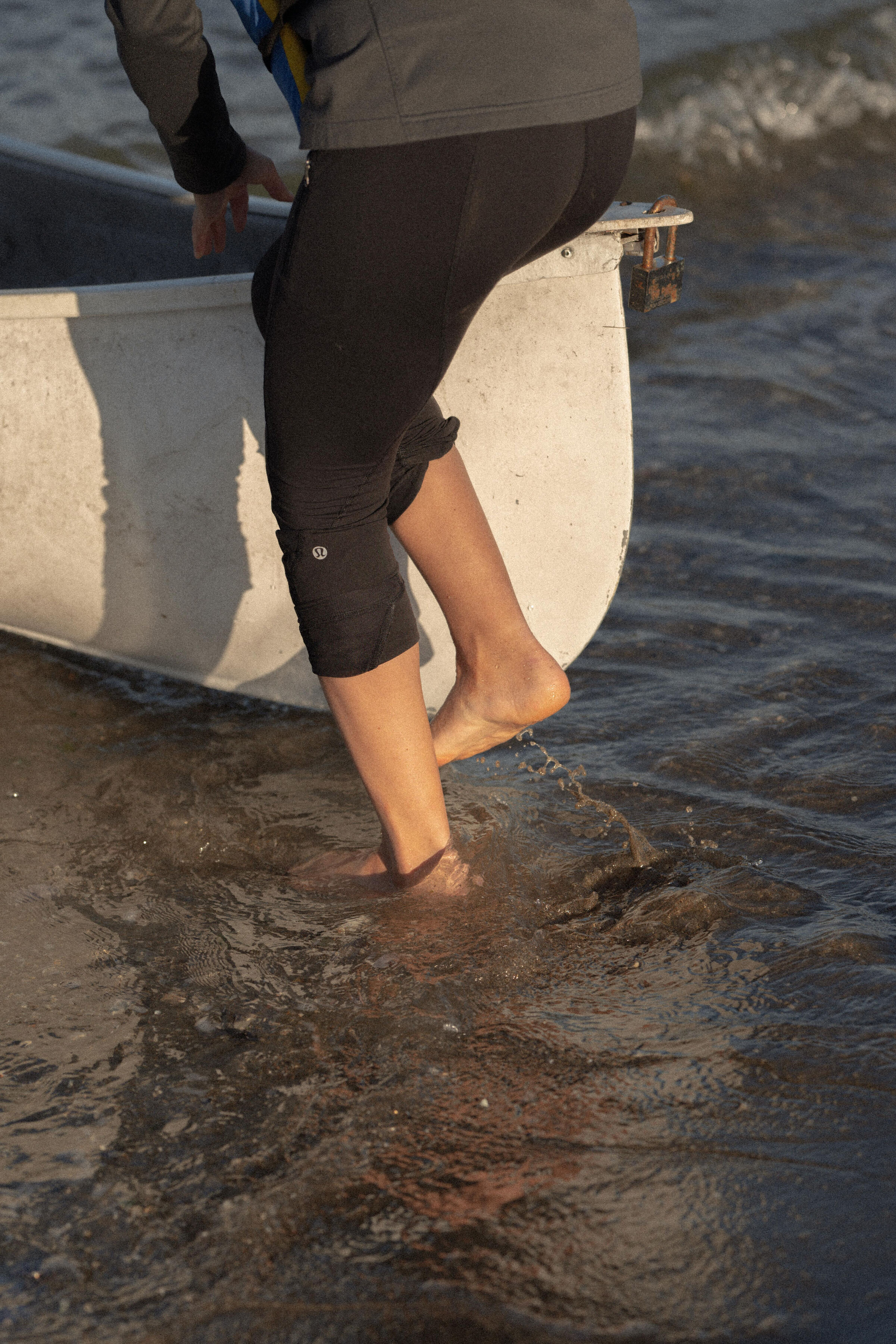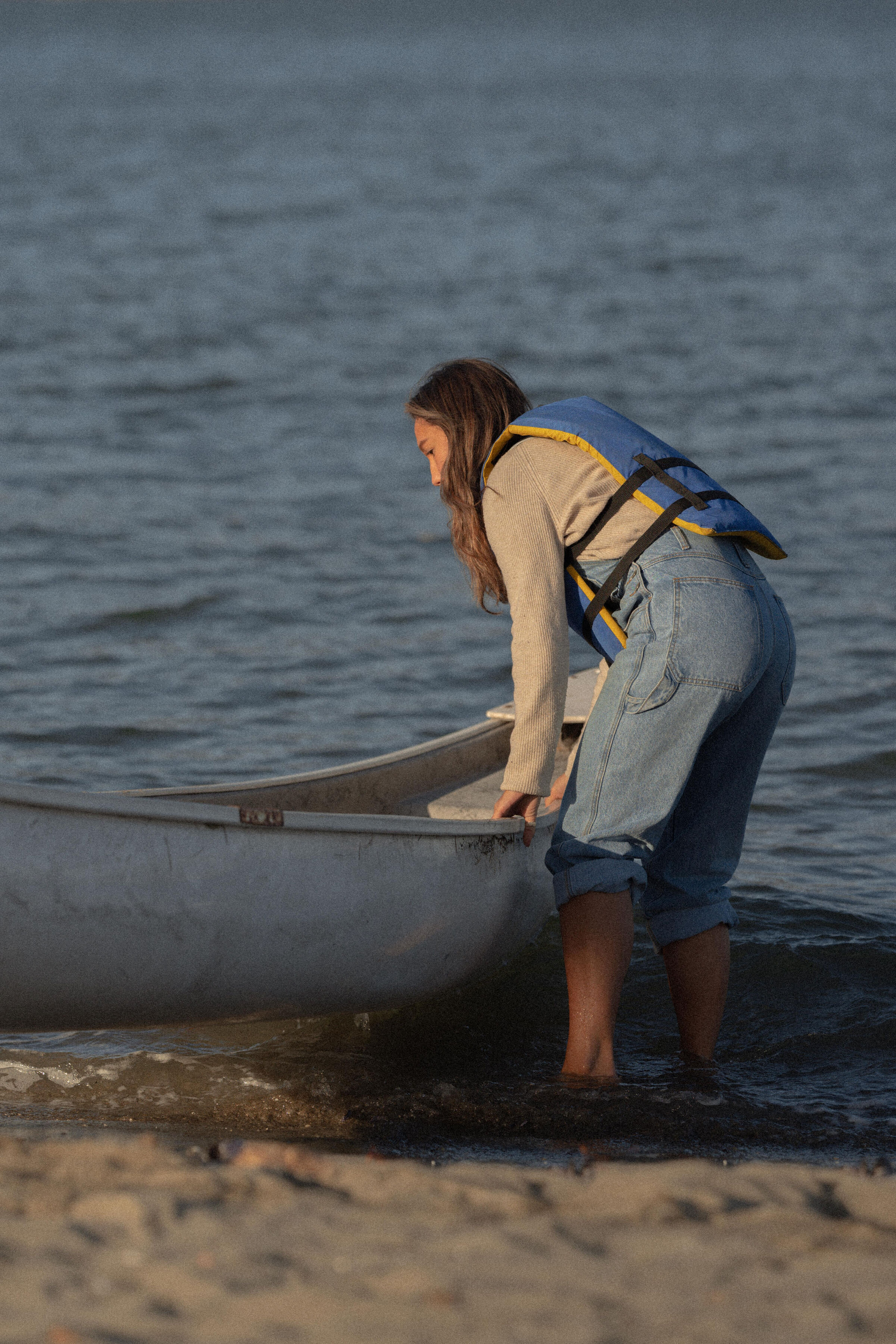Reclaiming the Land with Lenaya Sampson
Ta néwyap / Hi everyone!
Reclaiming the Land is a series of interviews with Indigenous women* that explores different ways of connecting with the land. Whether it’s deep in the wilderness or amidst the bustle of the city, pockets of peace and quiet teachings can be found anywhere.
*IWO is an inclusive space and women refers to gender expansive community members.
JERICHO BEACH, OCT. 30 // On a particularly stormy week at the end of October, the clouds managed to make way for an afternoon of conversations and canoeing. The backdrop of the city hung in the distance as Myia Antone, Founder of IWO, and Lenaya Sampson, Outdoor Guide & Teacher, settled on a large washed up log near the edge of the water. Rejoicing in one another’s company, they laughed and traced memories of their canoe trips down the Yukon River. The sea lapped at their feet as Lenaya reflected on her connection to land and water.
M: Would you like to start off by introducing yourself?
L: My name is Lenaya and I come from the Nlaka'pamux Nation, right where the Thompson and Fraser Rivers meet in Lytton, B.C. However, I was born and raised in Vernon, and later moved to Vancouver to complete my first degree in the Bachelor of Arts in Human Geography and English Literature. Now I’m completing my second degree through the Indigenous Teacher Education Program (NITEP) to be a secondary school teacher.
M: When you think about your connection to land and water, what do you think about? Is there a moment or feeling that comes to mind?
L: For the longest time, I felt really disconnected from my connection to land and water. As I got older and I was introduced to more people who had different world views—from my own community and from other walks of life—my relationship with water grew. One of the moments that I really learned to respect water is when I was paddling in Powell Lake. It was right before a huge rain storm, so all of the winds picked up. It was like the second time I paddled, and I quickly learned that if I worked with the water, it would help me at the same time.
Lenaya pauses for a moment and the wind fills the silence.
L: I’m still learning about that relationship. We’re river people, so I’ve always had an unsaid connection to water. I’m learning and accepting that’s who I am—you know, it’s hard to admit who you are and where you’re supposed to be when there’s so many people telling you where you should go.
Myia hums in acknowledgement.
M: Do you think your connection to water is allowing you to explore your connection to your culture and community as well?
L: I think that was the entryway, and learning to be outside in the outdoor education sector. It started to make me think, ‘how can I have a connection to this even more than just guiding somebody through it?’ It started giving me more inquisitions.
M: How did you start canoeing and hiking?
L: When I was fifteen, my aunt called me one morning and she said, “Lenaya, you have twenty-four hours to tell me if you want to go on a three week hiking outdoor education trip with a bunch of students you don’t know in Vancouver.” I was a really anxious child and teenager, but I said yes. That introduced me to Jeff Willis and his company, Fireside Adventures, and with that I learned how to canoe more.
M: Is that also how you started your career as an outdoor guide—being invited to go on an outdoor trip yourself and then wanting to share that experience with other kids?
L: Yeah, I was really inspired. It taught me that I was important and I was very much capable of achieving my dreams. It was the push I needed, and I just wanted to get more of it every single year. Eventually I wanted to pay it forward with other kids, because being out on the land and water is a place where people can be themselves.
M: Why do you think it’s so important to get youth out on these outdoor trips?
L: One aspect is the physical activity, of course. Another part is that there are so many lessons it can teach you even when you’re not looking for them. Sometimes it might feel like an inconvenience at that point in time, like why is it raining this hard and why is everything working against me, but in hindsight, you learn from those experiences too. It teaches you how to be humble. It teaches you to be curious. It teaches you respect.
The sound of waves lap on shore, drawing slow breaths in and out as the tide falls toward late afternoon.
M: What have you learned about yourself while you’ve been on canoe trips?
L: I’m always a lot stronger than I think I am.
Laughter fills the air and there’s an unspoken understanding—a shared experience that transcends words.
L: Physically, mentally, and emotionally. Canoeing for like eight hours a day is really tiring and physically exerting. And when I’m with other people, holding space for them and what they’re going through, and recognizing that’s where I was before, there’s an emotional connection as well.
There’s a pause as Lenaya pulls a memory from her mind.
L: You know at Fort Selkirk, how there’s that sand bar right across?
M: Mmm, yep.
L: Jeff suggested that I ferry over to that sandbar. He’s like, “Lenaya, I’m going, and you have the choice to either stay here and know that’s going to be on your shoulders for the rest of the year, or you can do it.” And so he went off first and did his thing, and I just sat there like, ‘What am I going to do?’ He had the carrot in front of the rabbit, and I was like, ‘Okay, I’m going to do it!’
The two of them fold into excited laughter.
L: So I talked to the river like it was my friend, and I was like “Okay River, you have to work with me here and I’ll work with you. I have another person in my bow that needs to get to that sandbar!” And once we got there, I realized Jeff had pushed me in a way, because he knew I could do it. It’s not that I wasn’t capable, it was my own mental block and anxiety around it.
M: Were the elders there?
L: Yeah, like Papa Don, and Frida.
The two share squeals of admiration.
L: Everyone was so cute! Frida gave all the girls earrings, and Papa Don braided sweetgrass with us. It was so amazing to see these youth so interested in learning about the culture… but then they had to try to take care of a braid of sweetgrass for the rest of the trip!
Gentle laughter erupts between them.
M: Can you tell us a bit more about the feeling you get while you’re canoeing or while you’re in the Yukon?
L: Everything slows down, but suddenly speeds up at the same time—you’re really in the moment, and then it’s gone! So, you either take it and learn with it, or it will just blow by until the next time you hear that teaching. I worked on enjoying those moments, because when I’m in the city, I don’t have them as often. I think what I learned from Papa Don the most that year is: if you’re not ready to hear the story, then please let it go.
M: In the moment you hear things that you need to hear, and if you’re not ready for that story or that teaching, then you let it go for someone else to pick up, and your time will come with it. There are so many lessons you learn in the canoe or while you’re on the land that you can take home into your everyday life.
A brief lull between words invites the sea to sing louder.
M: Would you say the Yukon holds a special place in your heart?
L: Yeah, it really does. I noticed it for the first time when I was challenged with really difficult weather. It was hailing and raining, but I knew I was capable and I had enough skills to get me through it. The next time I was at Fort Selkirk with you, and that was the first time we actually had time to interact. I realized more about why I felt so at home there, because I am a river person—my people are from the river. I always hold respect for that place, and then in return, it holds respect for me.
M: How many times have you gone down the Yukon River now?
L: Six times—this was my sixth year.
M: Wow!
L: I feel really safe there now. If I am respectful to the land and teach the youth how to work with nature rather than against it, then it will take care of us.
The wind picks up and whistles between their words.
M: I think being outside connecting with land and water always puts you in a more vulnerable state than when you’re in a city surrounded by cement. There’s doors and walls everywhere and it’s easy to feel really locked in. But when you’re outside on the land, you’re so vulnerable to yourself and to your surroundings. You feel things that you haven’t felt before. So I’m sure, going down the Yukon so many times, everytime you go, you feel that much more connected to it.
L: Exactly. Even though I was freezing, and I was wet, and I was cold, and I was hungry—it taught me perseverance and respect. It taught me how small I really am, but also really big at the same time. In the whole spectrum of the earth and the universe, I am only a grain of sand. In my community though, I am much larger.
M: You’re showing your youth where you come from and the power of your own voice and teachings. It’s so important for kids to see, and I think you show them that in a really beautiful, powerful way as an Indigenous woman.
Warm laughter fills the space between them as they stand from the log and stretch their legs. Reaching for lifejackets and paddles, Myia and Lenaya slide the canoe into the water, yipping as the cold sea rushes past their ankles. Slices of sunlight dance over the blanket of blue, and their words intertwine with the wind as they paddle away from shore.
Wa chayap yuu / Take care everyone.
This series is made in collaboration with Similar Space. A local content studio focused on people and the planet. Chen kwenmantúmi Sam and Alvaro.







